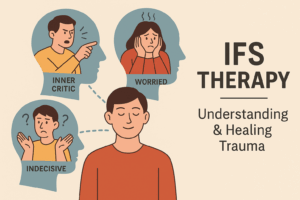What Is IFS Therapy and How Does It Heal Trauma?
Have you ever felt torn between two conflicting inner voices? Maybe part of you wants to move forward, but another part holds you back. Or perhaps there’s a part of you that says “yes” to others when deep down, you want to say “no.”
This type of inner conflict is incredibly common. And it’s exactly what Internal Family Systems (IFS) therapy is designed to help you understand and heal.
What Is IFS Therapy?
IFS therapy is a trauma-informed, evidence-based approach to psychotherapy developed by Dr. Richard Schwartz. It’s based on the idea that the mind is made up of different “parts,” and at the center of us all is a core Self—a grounded, wise, compassionate leader.
Instead of seeing your inner parts as problems, IFS therapy helps you view them as protectors doing their best to keep you safe—especially if you’ve experienced emotional wounds or trauma.
What Are “Parts” in IFS?
IFS therapy recognizes that we all have many subpersonalities or “parts.” Some of the most common include:
-
The inner critic
-
The people-pleaser
-
The controller
-
The procrastinator
-
The self-saboteur
These parts are like internal voices that carry thoughts, emotions, and coping strategies. They often develop early in life and can carry beliefs shaped by trauma or past relationships.
The Inner Critic: A Common IFS Example
Imagine you’re invited to give a presentation. Just before you begin, a voice inside says:
“Don’t mess this up. You’ll embarrass yourself like last time.”
This is the inner critic—a common protective part. It’s not trying to hurt you. It’s trying to protect you from judgment, shame, or failure. Underneath it may be a younger part that remembers what it felt like to be embarrassed or dismissed.
IFS helps you realize: You are not that voice.
You are the Self—the calm, compassionate leader within. You can acknowledge your past while creating new, more empowered responses in the present.
What Is the Self in IFS?
At the core of the IFS model is the Self. This is the part of you that is naturally calm, curious, confident, and connected. The Self is not damaged or wounded—it’s the inner healer.
Some clients visualize the Self as an ideal parent, a wise guide, or a nurturing presence that leads with compassion rather than fear or judgment.
IFS therapy helps you reconnect with your Self so that you can lead your system (your parts) with more clarity and confidence.
How IFS Therapy Heals Trauma
IFS is especially effective for healing trauma because it doesn’t just treat symptoms—it transforms your inner world. Here’s how:
1. It Honors Your Protectors
Parts that avoid, criticize, or shut down are trying to protect you. IFS therapy helps you understand their positive intent instead of fighting against them. These protectors often carry fears formed during childhood or in response to other people’s emotional projections.
2. It Connects with Wounded Parts (Exiles)
Beneath protective behaviors lie exiled parts—the ones carrying pain, shame, fear, or grief. These parts often hold the emotional wounds of the past. IFS creates a safe space to witness and care for them, rather than ignore or suppress them.
3. It Facilitates Unburdening
Once parts feel seen and safe, they can release limiting beliefs like “I’m not lovable” or “It was my fault.” In IFS, this process is called unburdening. Many of these beliefs were formed in childhood, and IFS helps you let go of that emotional baggage.
4. It Restores Inner Balance
When wounded parts are healed and protectors feel safe to step back, your system finds greater harmony. You’re no longer run by reactive parts—you’re guided by the Self.
Why IFS Therapy Works
IFS is non-pathologizing, deeply respectful, and empowering. It doesn’t label you as broken. Instead, it shows you that all your parts—even the ones you don’t like—have value and can heal.
If you’ve felt stuck in old patterns or overwhelmed by emotion, IFS therapy offers a new, effective path forward. It’s not just talk therapy—it’s a transformational experience that helps you access your inner wisdom and become your own healer.
Ready to Start Your IFS Journey?
If you’re curious about parts work therapy or ready to begin healing trauma with IFS, I’d love to support you. Reach out to schedule a consultation or learn more about how Internal Family Systems therapy can help you feel more grounded, whole, and free.


